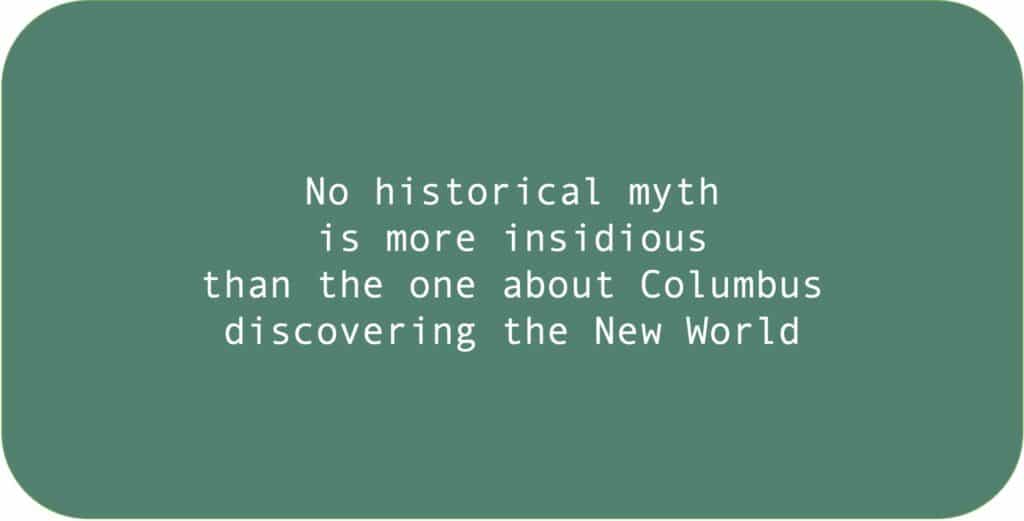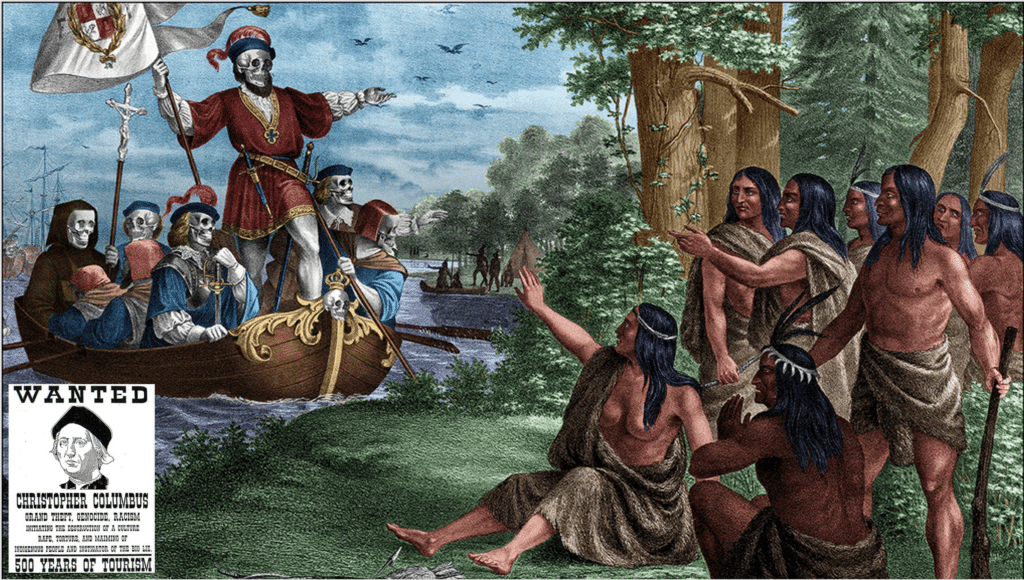
In fourteen hundred ninety-two
Columbus sailed the ocean blue
[Blah blah blah]
If, like me, you attended primary school in the 1960s or 1970s, you probably had to learn to recite the poem “In 1492” in its entirety. Teachers taught this poem with no compunction about the cultural annihilation and plunder it glorifies.
Christopher Columbus, the disoriented explorer
I grew up where Columbus landed and recited it with national pride. That pride, as it turns out, was nothing more than colonial indoctrination.
Imagine a poem whitewashing everything Cecil Rhodes did to colonize South Africa. Can you picture Black South African schoolchildren reciting a poem about Rhodes with pride? No, I didn’t think so.
Not to mention, Vikings stumbled upon the ‘New World’ long before Columbus. Still, I have no academic or jingoistic interest in debating which European landed first.
Dismissing Columbus as a terrible navigator might seem like a cheap shot. Except that he intended to sail to India in the east but landed in The Bahamas in the west.
Not to mention historical accounts of Vikings stumbling upon the “New World” long before Columbus. But I have no academic or jingoistic interest in debating which European landed first.
The Indigenous Peoples
Explorers don’t ‘discover’ natives. Yet, despite his epic navigation blunder, European imperiousness led Columbus to call the natives he met ‘Indians.’ And the rest, as we say, is HIStory
Well, it was until eminent historians like William Fowler began correcting the record. Instead of discoveries, they document European landings as invasions.
Correcting the historical record
Remarkably, those historians only had to refer to Columbus’s own journal, where his intentions are crystal clear. One entry reads incriminatingly:
They would make fine servants. … With fifty men, we could subjugate them all and make them do whatever we want.
Sure enough, that’s exactly what he and his men did to the hospitable, unsuspecting Tainos who greeted them. And it’s just one of the many reasons historians are finally casting a critical — if not accusatory — eye on the hagiography surrounding his voyages.
Here, for example, is how Howard Zinn frames this corrected version of history in A People’s History of the United States 1492-Present (August 2005):
To emphasize the heroism of Columbus and his successors as navigators and discoverers, and to de-emphasize their genocide, is not a technical necessity but an ideological choice. It serves – unwittingly – to justify what was done. …
The easy acceptance of atrocities as a deplorable but necessary price to pay for progress – (Hiroshima and Vietnam, to save Western civilization; Kronstadt and Hungary, to save socialism; nuclear proliferation, to save us all) – that is still with us.
Of course, Americans have celebrated Columbus Day for centuries, though Congress didn’t declare the second Monday in October a federal holiday in his honor until 1971.
Other countries throughout the Americas followed suit. But many, notably in the Caribbean, now designate this holiday as National Heroes Day. This shift reflects the cognitive dissonance scholars like Zinn have long pointed out.

America dishonoring Columbus
It’s worth noting that some cities in the United States are also following suit:
The Seattle City Council is replacing Columbus Day with Indigenous Peoples’ Day in the city.
The resolution that passed unanimously Monday celebrates the contributions and culture of Native Americans and the indigenous community in Seattle on the second Monday in October, the same day as the federally recognized Columbus Day.
(The Associated Press, October 7, 2014)
Columbus, Ohio, is his most famous namesake city. Yet even it has stopped celebrating a holiday in honor of this genocidal adventurer.
Whatever the case, here’s to a future where this holiday is more about the indigenous people. After all, history should focus more on the people who were already here in the so-called ‘New World,’ not on the European interlopers who just happened upon it.
Keep in mind, though, that Columbus remains a wanted man — for the sake of correcting the historical record.
* This commentary was originally published on Indigenous Peoples Day 2023
Leave a Reply
You must be logged in to post a comment.